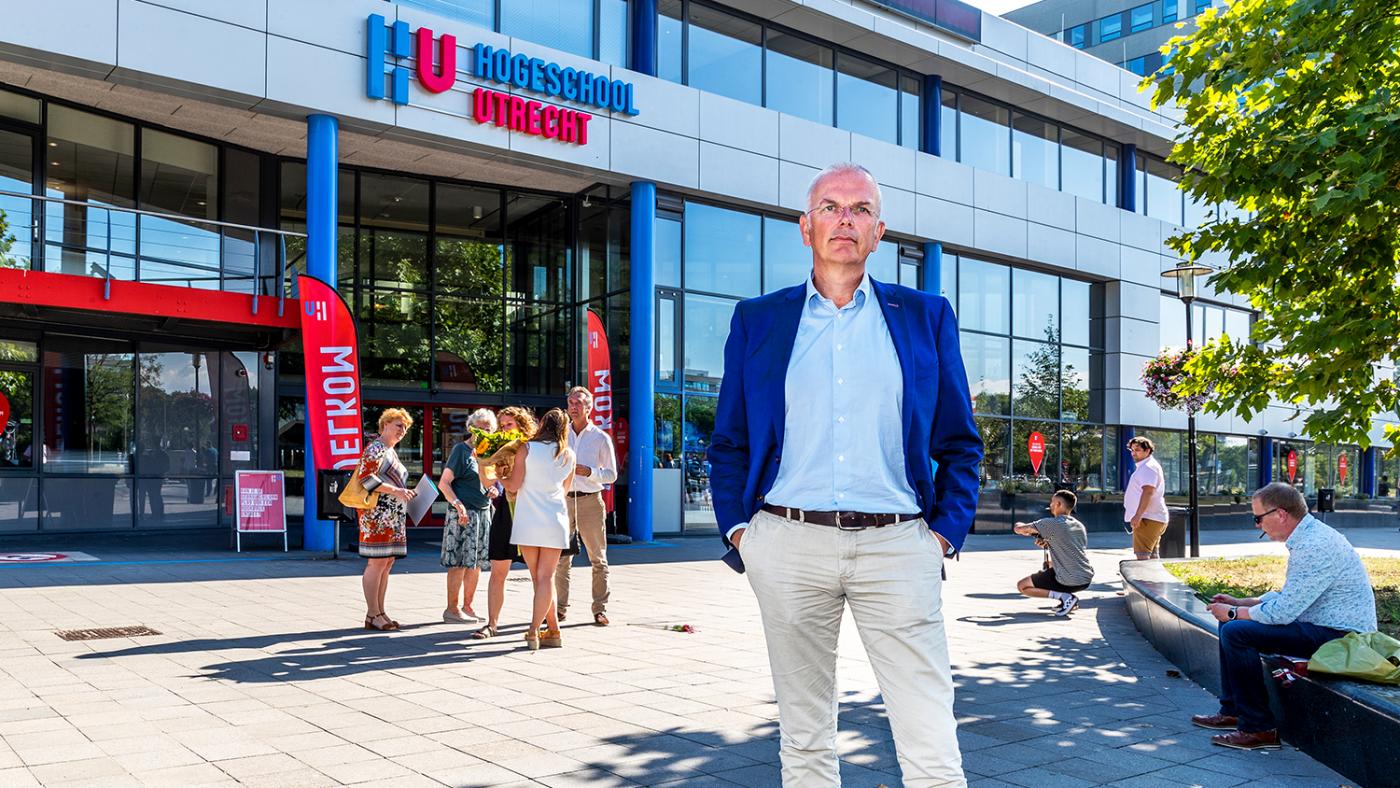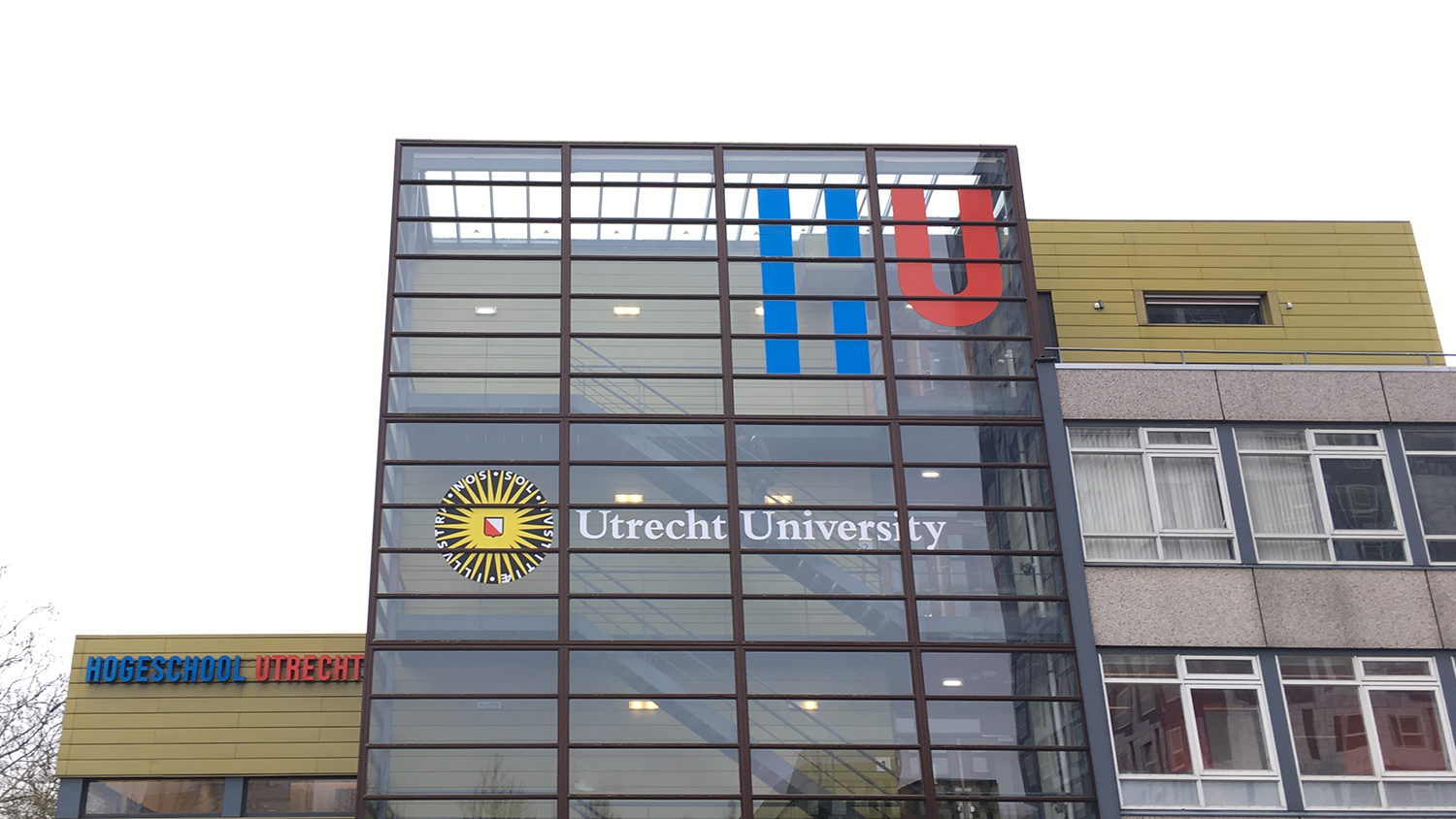Jan Bogerd: ‘Difference in status between hbo and university is unjustified’

Compared to the university, Hogeschool Utrecht is a young organisation without strong traditions. In the late ‘80s, several independent hbo schools merged to form one organisation. Now, the hogeschool is a higher education institution with over 34,000 students – larger than Utrecht University, which has around 30,000 students. Jan Bogerd has been at the HU for a long time, first as teacher at the Nature & Technology faculty, and later in the administration for the faculty of Economics & Management. In 2009, he became a member of the Executive Board; he became its president in 2015.
Why does the hogeschool want to concentrate its buildings in De Uithof?
“There are two reasons for this. In the past, the hogeschool consisted of many different buildings, spread out through the city. Many of these buildings needed to be renovated. We’re talking large investments to fix up these buildings. Another option was to let go of these buildings, and to bring the schools together in one single location. We chose the latter – it also contributes to efficiency and collaboration.”
What’s the most important difference between university and hogeschool?
“Let’s start with the most important similarity. We both educate students for our society. As hogeschool, we’re closer to professional practice. Our research, too, is focused more on practical application in society. You could say our student population is more diverse. There are students who come from the vwo high school level, but also those from havo, or mbo. Many vwo pupils choose university for its status. Bert van der Zwaan, the UU’s previous rector, said in his farewell speech: ‘do all these students really belong at university? Perhaps they’re just looking for a good applied education? There are too many students here who should be at the hbo.’ I think he’s right. The perceived difference in status isn’t justified. I think everyone who wants to work in a more applied, practice-based way will feel more at home at the hbo.
“At any rate, there’s more and more collaboration happening. Students from university and hogeschool sometimes join together in challenges in which they try to solve concrete local issues, and we have more and more employees who work both at the hogeschool and the university.”
Does the hogeschool aspire to become a research institution?
“We already are. Our lectors are conducting research, and we work on social innovation in healthy and sustainable living, the creative city, social innovation, and innovative education. Part of our research costs result from our first money flow, but from our second and third flows as well. There’s a special fund, SIA, for practice-based research, which is linked to research financer NWO, and which finances most hbo research projects. In our research, we also collaborate with the university, for example because researchers work at both institutions, or by sharing laboratories, like the Utrecht Science Park Innovation Lab Life Sciences & Chemistry.”
What influence can the hogeschool have on De Uithof’s liveliness?
“As people may have noticed, we bring a lot of liveliness to Utrecht Science Park. It’s good to share our facilities. In our buildings, we have food courts that are also frequented by university students. We also give our students the option and space to run a number of bars by themselves. You see study associations using these bars as their meeting places, but other students and employees are also welcome there. That’s the atmosphere that’s reflected in the recently presented ambition document. In it, we work together with the university and a number of other USP partners. It’s important for everyone at the Utrecht Science Park to turn this area into a lively one, and not just during the day.”
And how do you feel about hogeschool students being banned from the University Library during exam weeks?
“I understand the issues university students have, but to me, it’s a disappointing solution. It doesn’t fit with our campus philosophy. We should be looking for other solutions. Libraries are study facilities, paid for with public funds, so it’s disappointing that other students or pupils aren’t always welcome there. Conversely, university students are welcome in study spots in the hogeschool buildings, as well as in our media library which has extended opening hours.
“I think it’d be better to look at the organisation of classes, for instance at how you plan exam weeks. We have spread our exams throughout the weeks, and there’s a higher number of digital exams. This helps prevent peak loads and high pressure on facilities.”
Could the UU and HU perhaps make a deal to schedule classes earlier in the mornings, like they’ve done in Nijmegen, to prevent busy rush hours in trains – as the NS (Dutch Railways ed.) is requesting?
“I’m not in favour of that at all. We’re already spreading our class activities throughout the entire week. We’ve got start times throughout the entire day. Our students have 12 to 15 hours of classes a week, and it’s absolutely not the case that all classes start at 9. Bus 12 is also fully packed the whole day long.”
How do you see the joint future of the HU and UU at the Utrecht Science Park?
“I see many things already happening, such as sharing facilities. Look at the building at the Bolognalaan, which is used for classes from both the university and the hogeschool. Although our collaborations could be improved.
“We’re working with the university in terms of education. We have shared minor programmes, we’re looking at the flow-through of hbo students to the university’s Master’s programmes, and UU students who may be a better fit for hbo can come to us. We don’t make these flow-through agreements exclusively with the UU, however.
“Moreover, we can be proud of the knowledge development and the innovative power we have at the Utrecht Science Park. We work together in this as well. And I’d love for us to show this a little bit more to the outside world. One beautiful example I like a lot is a recent collaboration to battle the shortage of teachers in the Utrecht area. We worked together with the university, with high schools in the area, and with local governance. That resulted in a proposal we then presented to minister Slob of Education.”